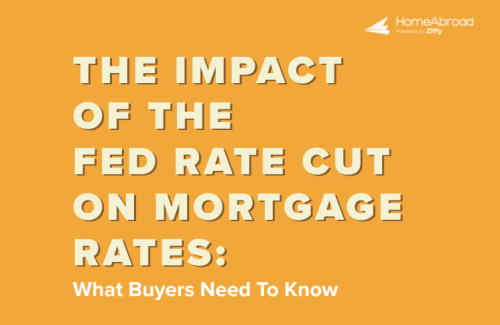Editorial Integrity
Making informed real estate decisions starts with having the right knowledge. At HomeAbroad, we offer US mortgage products for foreign nationals & investors and have a network of 500+ expert HomeAbroad real estate agents to provide the expertise you need. Our content is written by licensed mortgage experts and seasoned real estate agents who share insights from their experience, helping thousands like you. Our strict editorial process ensures you receive reliable and accurate information.
Key Takeaways:
1. Rates May Fall Gradually: The Fed’s recent rate cuts create room for mortgage rates to drift lower, but the drop will likely be gradual. Much of the expected easing was already priced into the market, so buyers shouldn’t expect sharp, immediate declines.
2. Don’t Wait Too Long: With mortgage rates inching down and buyer confidence improving, more people are re-entering the market. In many areas, limited inventory is still pushing home prices higher, which can offset the benefit of waiting for a slightly better rate.
3. Focus on Price, Not Just Rates: Locking in a good price now and refinancing later may be the best way to balance the current market dynamics.
Table of Contents
How the Fed Rate Cut Affects Mortgage Rates?
While the Fed’s rate cut suggests a downward trend in borrowing costs, the direct impact on mortgage rates is not always immediate. Here’s how:
- Current Mortgage Rates: As of November 26, 2025, the average 30-year fixed mortgage rate stands at 6.23%, according to Freddie Mac. That’s down from the peak of 7.2% in Jan 2025, when inflation pressures and bond yields pushed borrowing costs to their highest point of the year.
- Mortgage Rates Are Tied to Market Expectations: Lenders adjust mortgage pricing based on the bond market and expectations for future Fed decisions. Much of the anticipated easing was already baked into rates before the October cut, which is why the immediate change was modest. Most forecasts now suggest the 30-year fixed rate will hover around 6% range through 2026,
- Gradual Decline in Mortgage Rates: Rates have eased in recent months, but the drop has been steady rather than dramatic. That gradual movement offers some relief to buyers and investors, but rates are likely to remain around the “low-to-mid 6%” zone through 2026 unless there’s a significant shift in inflation or bond yields.
Get your personalized rate quote with HomeAbroad today and plan your next move with clarity!
What does This Mean for Homebuyers?
For homebuyers, this Fed rate cut brings both opportunities and risks:
- Lower Borrowing Costs: Buyers can benefit from lower monthly mortgage payments as rates trend down.
- Time to Act: Waiting for rates to fall further may not always be the best strategy. As demand increases due to lower rates, housing prices could rise due to lower inventory, making homes less affordable despite lower mortgage costs.
- Focus on the Purchase Price: It’s crucial to prioritize locking your rate in a favorable purchase price, as interest rates can be adjusted later through refinancing. The mantra “date the rate, marry the house” highlights this strategy.

Steven Glick,
Director of Mortgage Sales, HomeAbroad Loans
A Balanced Approach for Real Estate Investors
While lower mortgage rates make financing more attractive, supply shortages and high demand still shape the housing market. In many states, demand remains strong, and home prices are likely to rise as more buyers enter the market following the recent rate cut.
This creates a timely opportunity for real estate investors to act quickly and secure properties while rates have just lowered. By doing so, they can capitalize on future property price appreciation, building home equity as increased buyer demand continues to drive market growth.
Ready to take the first step?
HomeAbroad is a one-stop shop for international buyers buying US real estate. We offer tailored mortgage programs, specialized agents, concierge services, LLC setup, and property management—all in one place.
Get started now!
FAQs
Does the Fed rate affect mortgage rates?
Yes, the Federal Reserve (Fed) rate does affect mortgage rates. When the Fed changes its rate, it influences banks’ overall borrowing costs, which can lead to adjustments in mortgage rates.
What is a Fed rate?
The Fed rate, or federal funds rate, is the interest rate at which banks lend money to each other, set by the Federal Reserve. It influences borrowing costs, consumer spending, and inflation, serving as a benchmark for various interest rates, including mortgages and credit cards.
At HomeAbroad, we ensure the reliability of our content by relying on primary sources such as government data, industry reports, firsthand accounts from our network of experts, and interviews with specialists. We also incorporate original research from respected publishers when relevant. Discover more about our commitment to delivering precise and impartial information in our editorial policy.
CBS News: FED September Rate Cut
KPBS Public Media: Impact of FED Rate Cut
Kiplinger: Will the Fed Rate Cut Lower Mortgage Rates?
Freddie Mac: Conventional Mortgages Rate



















